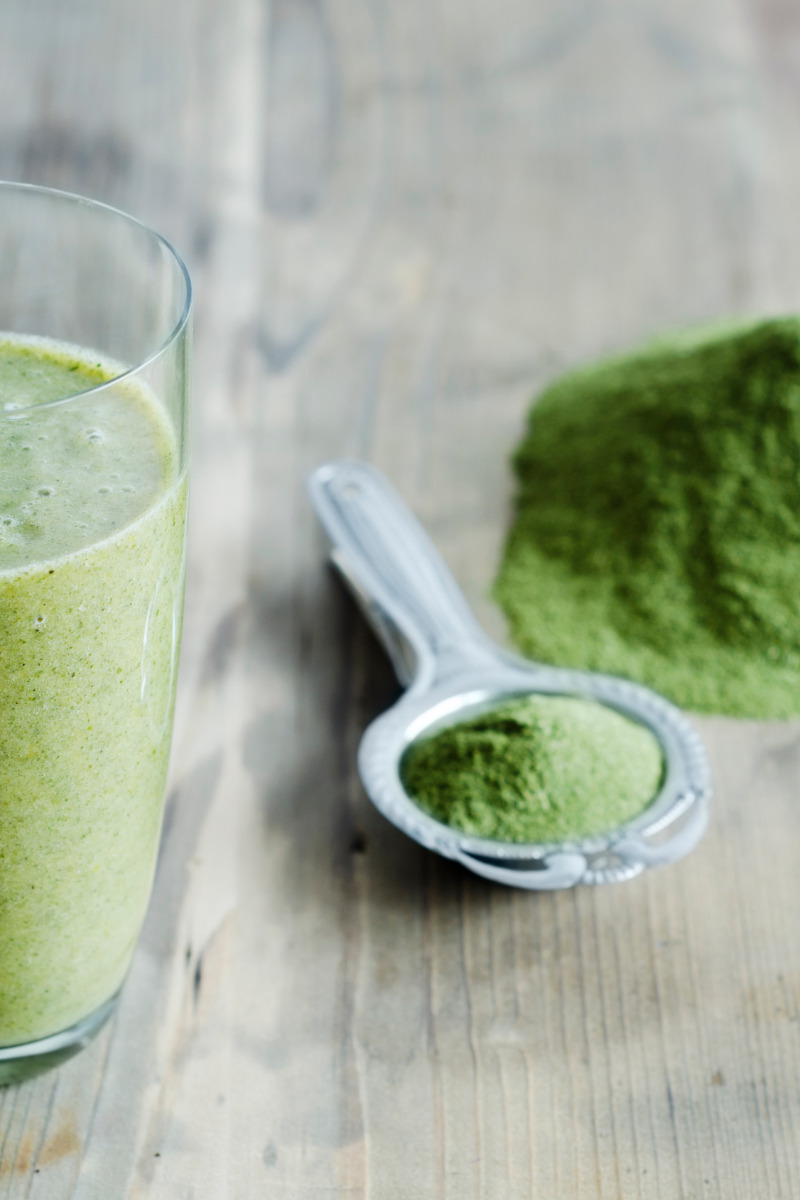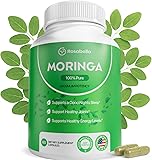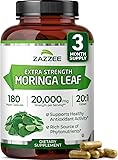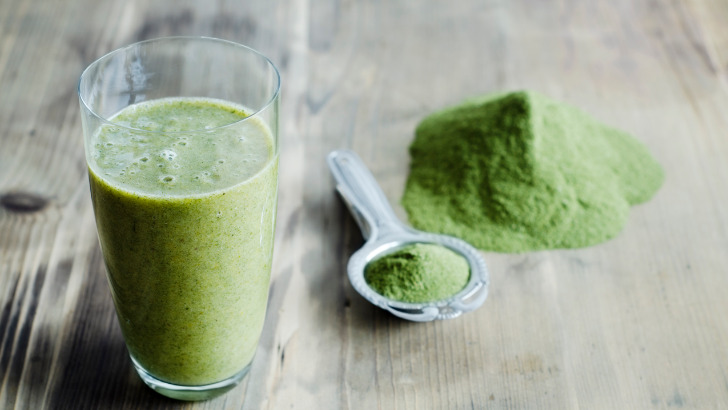Moringa is a plant that’s been used for centuries in traditional medicine for its healing properties. It’s become popular in the Western world as a superfood with a reputation for numerous health benefits. If you’ve heard of it, you might logically ask: What does moringa taste like and how can I add it to my diet?
To get the answers to those questions and more, read on.
What is moringa?
Moringa oleifera is a nutritious plant that’s native to India, Pakistan, and parts of Africa. It goes by various names besides moringa, including tree of life, miracle tree, drumstick tree, horseradish tree, and ben oil tree.
In some parts of the world, moringa is a valuable food source because of its nutritional content. The leaves and pods of moringa are good sources of protein, vitamins, minerals, and a wealth of antioxidants. Most parts of the tree are edible, fresh or dried, and safe to use for medicinal purposes.

What does moringa taste like?
Moringa has a slightly bitter flavor that’s been compared to spinach, asparagus, horseradish, and matcha. The bitterness isn’t one-sided, though. It’s balanced with a delicate sweetness and earthiness.
The taste of moringa can also vary, depending on which part of the plant you consume:
- Moringa leaves have a more delicate, pleasant flavor.
- Moringa seeds, when roasted, taste like green peas.
- Moringa powder is earthy.
If you don’t like bitter foods, you might not love the taste of moringa on its own. But don’t worry — with a bit of creativity, you can improve on the taste and realize moringa’s superfood benefits. Try these moringa hacks:
- Add moringa to smoothies. Blend it with sweeter ingredients like bananas or berries.
- Make moringa tea. The taste will be milder than consuming the leaves or powder directly. You can also add a bit of honey to your moringa tea.
- Roast moringa to play up the plant’s nutty flavor.
- Add small amounts of moringa to soups or stews. Other flavors in the dish should moderate the plant’s bitterness.
The health benefits of moringa
So, what are those superfood benefits moringa can deliver? Moringa is thought to boost immunity, reduce inflammation, improve digestion, and support cardiovascular health. It is also known to have anti-cancer properties and may help regulate blood sugar levels.
1. Boosts immunity
Moringa contains high levels of antioxidants like vitamin C, beta-carotene, and quercetin. Studies have shown these compounds can improve overall health and boost the immune system. Additionally, moringa leaf extract has demonstrated immune-boosting effects in animal studies. Further human studies are needed to confirm these findings.
2. Reduces inflammation
Moringa has been traditionally used in Ayurvedic medicine to treat inflammation-related conditions such as arthritis, asthma, and bronchitis. The plant contains high levels of anti-inflammatory compounds including flavonoids, phenolic acids, and glucosinolates. Various studies show these compounds can fight inflammation and reduce oxidative stress. Moringa’s vitamin C content — as much as an orange — can also reduce inflammation.
3. Improves digestion
Moringa is believed to improve digestion for a few reasons. One, it is rich in fiber. Fiber helps regulate bowel movements and prevent constipation. Two, moringa contains compounds that stimulate the production of digestive enzymes. Those enzymes work to break down food and help your body absorb nutrients. And finally, the anti-inflammatory properties of moringa also reduce inflammation in the digestive tract. That can improve overall digestion and reduce bloating.
4. Supports cardiovascular health
Moringa contains compounds like quercetin and chlorogenic acid. These may help to lower blood pressure and reduce the risk of heart disease. Some studies have also shown that moringa may help improve cholesterol levels and reduce plaque buildup in the arteries.
5. Fights cancer
Flavonoids and phenolic acids, found in moringa, inhibit the growth and spread of cancer cells by neutralizing free radicals, reducing inflammation, and preventing DNA damage. Moringa also contains quercetin, kaempferol, and niazimicin, and studies show these also have anti-cancer properties. Additionally, moringa’s immune-boosting properties may also help the body fight off cancer cells.
6. Regulates blood sugar
Moringa may regulate blood sugar, thanks to its high fiber content and chlorogenic acid. Fiber slows the absorption of carbohydrates in the body and chlorogenic acid may help lower blood sugar levels.
Studies have shown moringa extract may help increase insulin secretion and improve insulin sensitivity, which further supports its use as a natural blood sugar regulator.
How to work moringa into your diet
Moringa’s taste and health benefits are intriguing, right? So let’s talk about how you can work moringa into your diet. And if you’re wondering about when you might start to feel healthier after consuming moringa, see this resource to answer the question: how long does it take for moringa to work?
Here are 10 ways you can start eating moringa.
1. Fresh leaves
Add fresh, raw moringa leaves to salads, smoothies, sandwiches, wraps, stews, and soups. You can also steam or stir-fry moringa leaves and eat by themselves or with other vegetables.
2. Powder
You can grind moringa leaves into a powder that will enhance the flavor and nutritional profile of many dishes.
3. Tea
Make your own caffeine-free tea by steeping fresh moringa or moringa leaf powder in boiling water.
4. Oil
You can buy moringa oil for topical use to treat various skin and hair conditions. Health food stores and Amazon also carry moringa oil for use in cooking.
5. Roots
You can boil moringa roots and eat them as a vegetable side dish.
6. Seeds
Roast moringa seeds for a healthy, tasty snack.
7. Flowers
Moringa flowers are edible — add them to salads or use them to make tea.
8. Capsules
If you don’t like the flavor of moringa or you can’t find it fresh near you, you can always invest in moringa supplements. They’re readily available on Amazon.
- MORINGA OLEIFERA…
- SUPERFOOD BLEND…
- ROOTED IN WELLNESS…
- CARLYLE…
- NATURALLY FREE OF…
- Rosabella Moringa…
- Nature’s…
- The Caffeine…
- Clean & Conscious…
- Join the Rosabella…
- ✔️ TNVitamins…
- ✔️ Four…
- ✔️ Moringa…
- ✔️ Moringa…
- ✔️ TNVitamins…
- 180 CAPSULES…
- 20,000 MG STRENGTH…
- ORGANIC MORINGA: Any…
- NATURAL, VEGAN…
- GOLD STANDARD…
- Discover THE PUREST…
- HARVESTED FROM THE…
- THE MOST NUTRIENT…
- 100% SATISFACTION…
Moringa — bitter is better for you
Moringa is a bitter-tasting plant that’s native to the sub-Himalayan areas of India, Pakistan, Bangladesh, and Afghanistan. In developing countries, the leaves, bark, flowers, fruit, seeds, and root are used to make medicine. In Western cultures, moringa is gaining popularity as the next big superfood because it’s linked to a wide range of health benefits.
You can consume fresh moringa or add it to your diet using powders, capsules, teas, or oils.
Moringa FAQs
Why should I add moringa to my diet?
Moringa is packed with vitamins and minerals. It is particularly high in vitamins A and C, calcium, potassium, and protein. It also contains eight essential amino acids and other powerful antioxidants.
What is the taste of moringa?
Moringa has a green, earthy taste, similar to spinach or matcha green tea. It is somewhat bitter, but you can mix it into other foods or beverages for a more subtle flavor.
What are the potential health benefits of moringa?
The moringa plant has been studied for potential health benefits, which include anti-inflammatory properties, protective effects against cardiovascular diseases, boosting the immune system, improving digestive health, and potentially improving mental clarity and stamina.
How can I include moringa in my diet?
Try consuming moringa as leaves, powder, capsules, tea, and oil. You can add the powder to your smoothies, soups, or meals or you can brew it as tea.
Are there any side effects of consuming Moringa?
Moringa is considered safe for consumption, but you should start with small doses to see how your body reacts. It does act as a diuretic, so proceed with caution if you’re at risk of dehydration. Always consult with a healthcare provider before starting any new supplement.
Can I eat too much Moringa?
It is possible to consume too much moringa. The signs of overconsumption include upset stomach or heartburn. Moringa has high amount of vitamin A, which can be toxic in large doses.
Can I grow moringa at home?
Moringa is a tropical tree and thrives in warm climates with plenty of sun. It can grow in poor or good soil conditions and requires little water. If you live in a suitable climate, you can try growing it at home!
Can I cook with moringa?
You can use moringa in a wide range of recipes. Try using fresh moringa leaves as a substitute for spinach, or add the powder to soups, stews, smoothies, and more. You can also roast the seeds or press them for oil.
How does moringa compare as a superfood to spirulina?
Spirulina is a blue-green algae that’s edible and packed with nutrients. Spirulina has more protein than moringa, but moringa has more antioxidants.
Last update on 2026-02-23 / Affiliate links / Images from Amazon Product Advertising API





